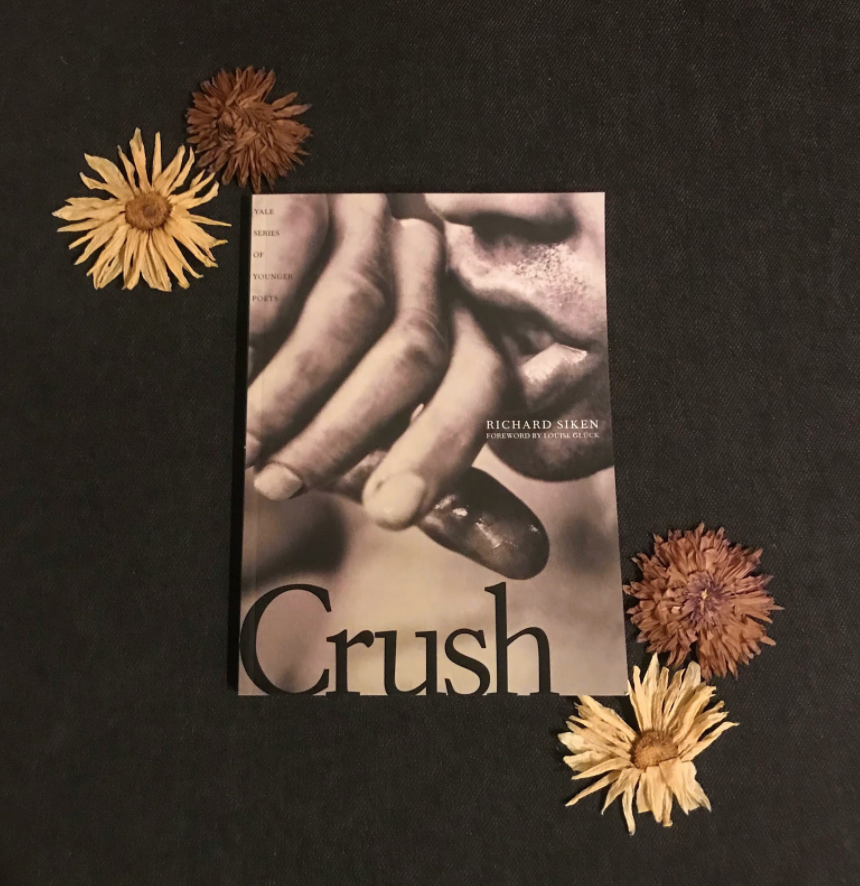Written by: Nicole Catarino
Richard Siken’s poetry collection Crush is not one you can start and finish in the same sitting, and I mean that as the highest compliment.
Siken is an American poet and the author of Crush (2004) and War of the Foxes (2015). Crush won the 2004 Yale Younger Poets award and, within a year, became a cult classic among poets and poetry fans alike. His poetry books typically revolve around his experiences as a gay man, but Crush in particular is known for its heart-wrenching exploration of human emotion, love, and its overarching tone of fear.
On the surface, Crush is a book about love in a world where the love you experience can hurt you, and you don’t know if it will consume you or save you in the end. Siken writes about heartbreak and regret, second chances and dreams, and relationships both dangerous and loving alike. Surrounded by motifs of hands, cars, and violent, bloodied displays of passion, Crush paints depictions of love and violence side by side to portray the panic that often comes with the surrender to vulnerability.
Though the crux of the book stems from the discussion of love and the horror that can come with it, Siken, more than anything, writes about the mundane in a way that seems significant. He finds a way to put words to small but poignant human experiences in a way that both terrifies and comforts—the former, because it forces you to confront things that typically remain unspoken; the latter because you discover that somebody else has felt the same way you do.
I had been trying to get my hands on this poetry book for years now, only finally managing to do so thanks to a late-Christmas/early-birthday/why-not present from a friend. My original intention was to finish it that day so I could give my friend my honest review while I was still in their company. Two poems in and several quiet oh my god’s later, I had to put it down. Not because I couldn’t power through it, but because I knew I’d be doing the writing a disservice if I tried.
I’ve always loved Siken’s poetry, but it’s hard to explain the effect it has on me. This book is raw; it’s tender, both like an embrace and a wound, and each poem leaves you breathless like a punch to the emotional solar plexus. With lines like “Love, for you, / is larger than the usual romantic love. It’s like a religion. It’s / terrifying. No one / will ever want to sleep with you” and “Tell me we’re dead and I’ll love you even more”, I frequently found myself stepping away from this book feeling a little winded (Siken, 14, 9). Needless to say, there are lines from this book that have stuck with me long after I finished reading it .
In one of his poems titled “Planet of Love”, Siken writes about life and death as though they’re scenes in a movie where you’re merely reading off a script. He writes “…you play along, / because you want to die for love, / you always have” and I gasped while reading it because I hadn’t expected him to say that kind of secret desire so plainly (Siken, 39). Even with less intense declarations where Siken writes things like, “I sleep. I dream. I make up thing / that I would never say. I say them very quietly” in his poem “Meanwhile”, I find myself feeling just as exposed and just as seen by his writing. Each poem by itself captures a different array of scenes and moments that may seem ordinary — like eating ice cream, driving a car, or going grocery shopping — but Siken is able to grant them a sense of grandiosity with his purposeful syntax and emotion-filled wordplay .
A friend of mine who shares my same, visceral reaction to Siken’s poetry told me about their old English teacher, Mr. Heebs, who once said, “Poetry is lightning strikes; you’re in it for the turn, for the one line when everything coalesces and a point is made elegantly…Prose is a tapestry; there are threads to follow and details here and there you’ll pick up every time you read but you won’t get the full picture until you’re done…” My friend concluded that the beauty of Crush comes from the fact that “Siken builds tapestries out of lightning strikes.”
It was certainly more succinct than my rationale, though no less accurate. Siken fills his book with lines that carry their own weight and uses them to craft a powerful narrative tracking the narrator’s tumultuous journey through his relationship with men, his own thoughts, and the world around him. Each piece connects to each other, but each poem and each line can stand on its own. Through Siken’s vivid imagery and sharp truths, he creates stirring poetry as awe-inspiring as a lightning storm itself, making Crush a favorite poetry book of mine for many years to come.

